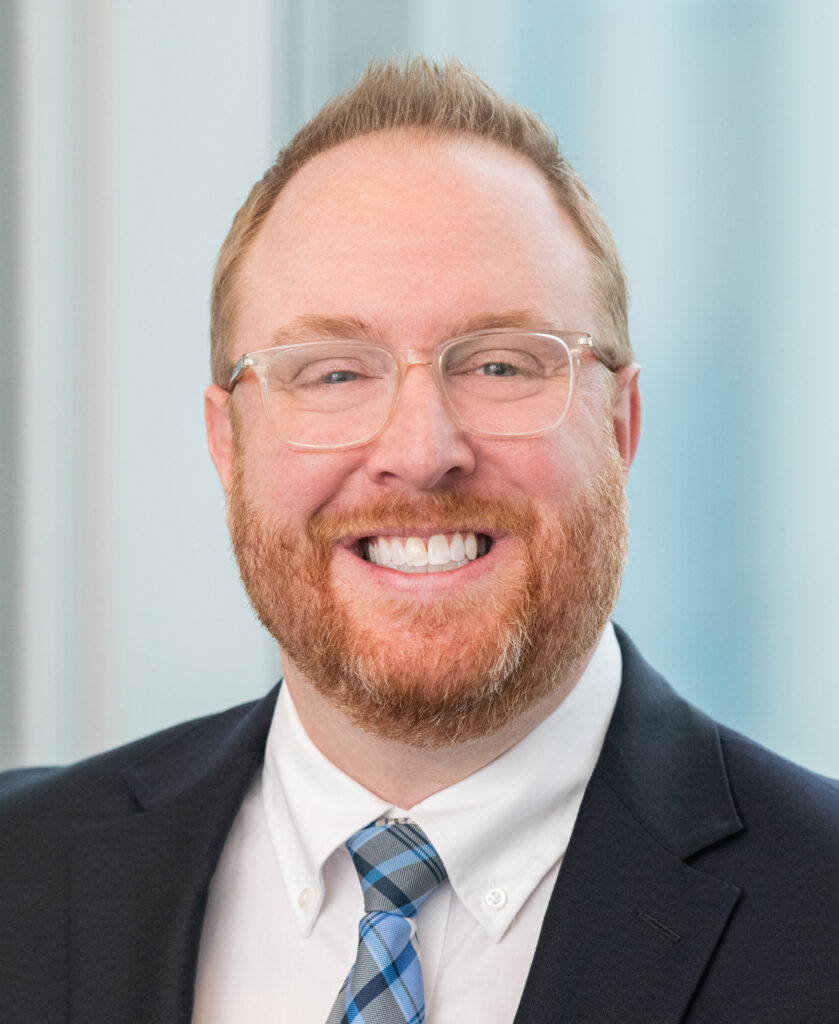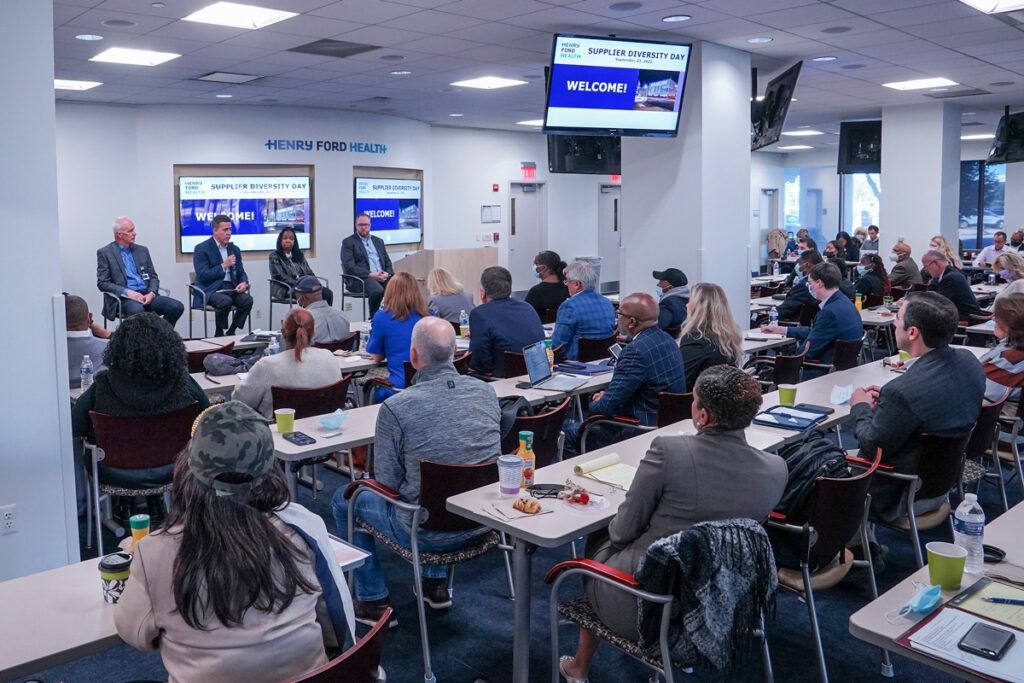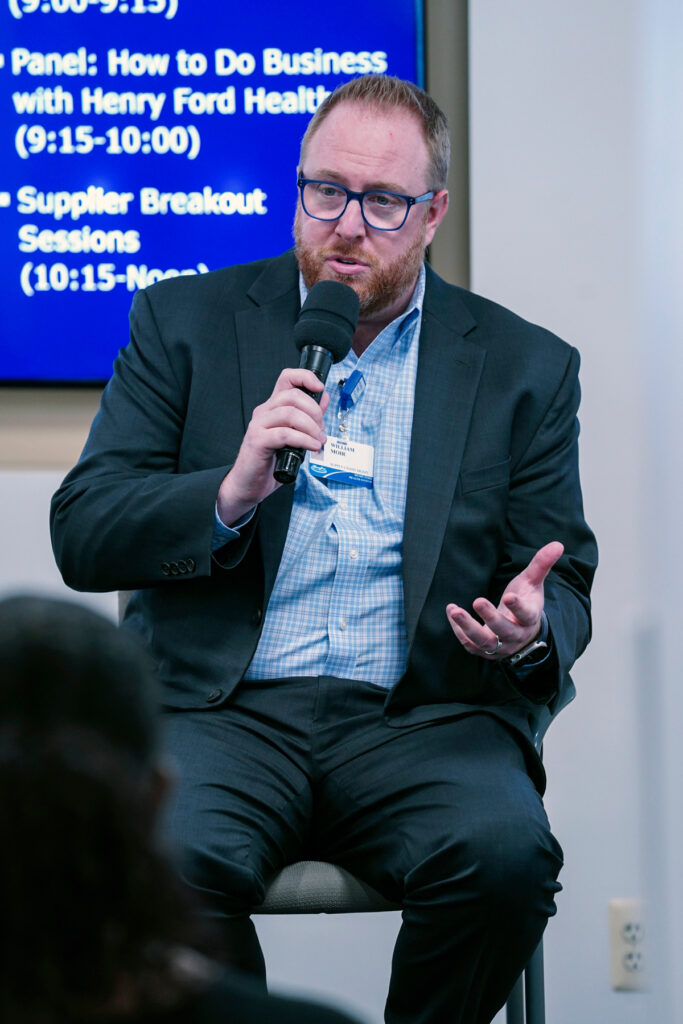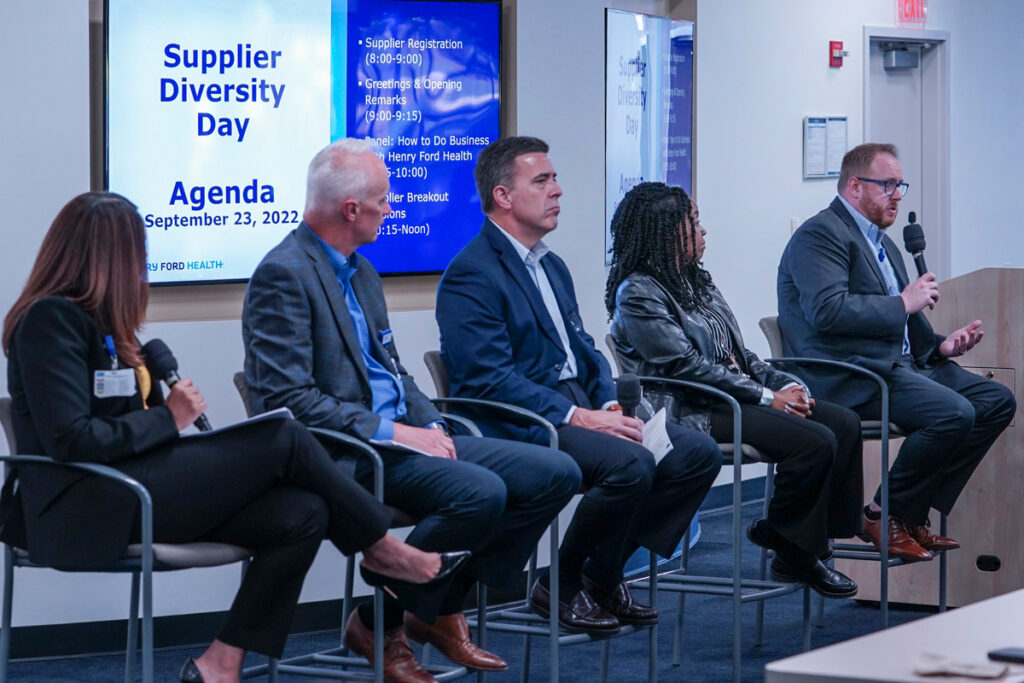Henry Ford Health’s supply chain team is the organization’s “horsepower under the hood,” says this year’s JHC Contracting Professional of the Year.
February 2023 – The Journal of Healthcare Contracting

Henry Ford Health believes that everyone benefits when all businesses are afforded an opportunity to compete in the healthcare marketplace. To that end, it reinvested in its supplier diversity program, partnering closely with its strategic sourcing to ensure that diverse suppliers are identified, included, evaluated and awarded appropriately as part of the formal bid process.
“We’re one of the health systems that signed a pledge as a member of the Healthcare Anchor Network (HAN), and its multifaceted goals from supply chain to sustainability to hiring,” said Bill Moir, senior vice president of supply chain management for Henry Ford Health, and this year’s JHC Contracting Professional of the Year. “We have some lofty goals around supplier diversity which we aim to achieve through our multi-disciplinary Supplier Diversity Champions Committee.”
“This isn’t just a supply chain issue at Henry Ford, it’s an everyone issue,” he said.
Moir has served as senior vice president of supply chain management for Henry Ford Health since January 2021. His responsibilities involve overseeing all supply chain functions, including strategic sourcing, supplier diversity, purchasing, accounts payable, linen, supply chain systems and analytics, supply chain operations, and distribution and logistics.
He has held supply chain leadership roles in some of healthcare’s leading organizations such as Advocate Aurora Health, Ascension Health and Trinity Health. He is a champion for integrating supply chain management into clinical and financial outcomes and putting the stakeholders and communities he serves first.
Increasing diversity spend uplifts communities
Henry Ford Health’s supply chain connects with departments from across the integrated, nonprofit health system to increase diversity spend in different areas that have targets for growth. Sourcing diverse and local suppliers is critically important to the health system, which serves Metro Detroit and south central Michigan, while bringing domestic manufacturing back to Detroit is an even larger goal.
“Domestic manufacturing not only helps to derisk the supply chain, but also helps to create jobs, which is huge for health equity,” Moir said. “It’s not just about sourcing. It’s about creating income and wealth because you cannot keep people healthy if they cannot afford food, housing or insurance. So, creating jobs in those communities we serve at Henry Ford is what supplier diversity is about. It’s an easier pathway to health equity and we’re very committed to it.”
Henry Ford Health also hosts community outreach events for strategic introductions between suppliers and system stakeholders. It is strategic around partnering with vendors in the community that have been historically marginalized and making the community healthier.

“Supplier diversity lives in our Community Empowerment pillar within our Henry Ford Health Diversity, Equity, Inclusion and Social Justice Plan,” Moir said.

The health system partners with community organizations like United Way for Southeastern Michigan to create a community information exchange – a grassroots council that targets patients, especially senior citizens, who are experiencing food insecurity. It’s called Closing the Loop and it’s a partnership between United Way for Southeastern Michigan, Henry Ford Health, Templin Medical Center, Gleaners Community Food Bank and Fish & Loaves Community Food Pantry.
A Henry Ford Health doctor notifies a United Way representative about a patient’s food needs. That representative then calls the patient to set up an appointment at Fish & Loaves, which provides the patient with free, nutritious food at their location. Then, a United Way representative follows up to support the patient throughout the process and help with other needs.
“This has the capacity to serve over 500 patients by the end of 2022. That’s the goal,” Moir said. “And we plan to identify and recruit at least five other healthcare organizations to scale these efforts in 2023. We plan to complete 350,000 food insecurity screens and 75,000 full social need screens by the end of 2023.”
The Healthcare Anchor Network Impact Purchasing Commitment
Collaborating with other healthcare organizations is important to Henry Ford Health.
In 2021, it signed the HAN Impact Purchasing Commitment with 12 other HAN member health systems across the country to build healthy, equitable and climate-resilient local economies through what and how they spend their dollars. This includes increasing spending with Minority and Women Owned Business Enterprises (MWBEs) as well as local and employee-owned, cooperatively owned and nonprofit-owned enterprises by at least $1 billion collectively over five years.
For sustainability, signatories committed to selecting a minimum of four Core Sustainability Goals and to achieving each goal within five years. For community wealth building, signatories committed to establishing and tracking progress toward five-year spend goals with vendors that are locally headquartered, owned and operated at the neighborhood or regional level, and majority employee-owned, cooperatively owned and nonprofit-owned enterprises.
Finally, signatories committed to implementing strategies, policies and practices to incentivize internal departments, vendors and GPOs to engage in impact purchasing.
Investing in domestic manufacturing and mitigating manufacturer risk
“Resiliency must be a strategic pillar of the healthcare supply chain,” Moir said. “It’s critical we have the supplies we need. Historically, supply chains have pushed for the lowest cost – high quality, but lowest cost – and that created some of the challenges we had in the pandemic. Now, we’re looking at how to derisk the supply chain and a cornerstone of that strategy must be domestic manufacturing, but that’s not the only answer. Supply Chain resiliency must be diversified like your personal investment portfolio.”
Henry Ford Health has invested with Premier, its GPO, and 15 other Premier members in Prestige Ameritech, a diverse American manufacturer based in Texas, for masks. It has also invested in DeRoyal Industries in Tennessee for gowns. And it’s participated in a domestic glove resiliency program with Honeywell.
It’s also part of a group of Premier members working on risk scoring manufacturers. “Everyone is trying to get this information,” Moir said. “We’re figuring out how to make the resiliency variable more objective to include in our strategic sourcing selection scorecards.”
“If Vendor A has a risk score of 10 with low risk and Vendor B has a risk score of 90, then that should be considered when you select supplies through the sourcing process,” he said. “And if 90% of your manufacturing is in Shanghai, China, that’s not diversification.”
Moir said scale is going to be the key, not only with obtaining more manufacturer data but also in efficiency. “Ten individual IDNs doing this score carding separately would be a heavy lift. Why would you duplicate efforts? It’s another good collaboration opportunity with partners like Premier and others in the industry,” he said.
Rolling out supply chain inventory management and analytics, and overhauling P2P
Henry Ford Health has rolled out its Point of Use Supply Chain Inventory technology in the past year, which is predicated on safety, revenue and data capture.
“A lot of people think inventory management when they think Point of Use, and that’s certainly a benefit, but our goal is to translate data capture into actionable outcomes,” Moir said. “We’re just starting phase two of continuous improvement with data capture, but what makes us unique is our methodology and approach with a direct connect between our EMR and ERP.”

The Point of Use strategy is a collaboration with Henry Ford Health’s IT, clinical stakeholders and operators, and supply chain team. “This is going to be the bread and butter to make us successful. It’s a huge initiative,” Moir added.
The health system has also overhauled its Procure to Pay (P2P) program from start to finish. “P2P is really moving from the sourcing to the implementation of the products, making sure we have the right controls in place around financials and controlling the supply chain in cost and care,” Moir said. “The only way to make sure we control the supply chain is through our collaborations with our clinicians.”
Moir says Henry Ford Health has a strong history of clinical collaboration but it’s seeking even more transparency around supplies and a wider net for cooperation with medical groups and private physicians. These strong relationships will be leveraged toward a more consistent and inclusive sourcing methodology.
Its strategic sourcing leads 14 system-wide value analysis teams that meet regularly to assess current and potential new products, services and equipment, and it manages the health system’s GPO relationship with Premier.
“We had a really great foundation when I arrived at Henry Ford to build from,” Moir said. “Leadership at Henry Ford has made it a point to say supply chain must be a strategic differentiator. We’ve invested in our data management systems and analytics team, and we’ve brought in diverse talent and collaborated with multiple stakeholders.”
Moir believes people truly are the strategic differentiators in healthcare organizations and supply chains. His servant leadership approach intends to enhance engagement with his customers, stakeholders and team. Moir believes this engagement and collaboration must be centric to challenging the status quo related to supplier diversity, analytics, resiliency and realizing value in supply chain. “We have a phenomenal Supply Chain team at Henry Ford Health, they truly are the horsepower under the hood,” Moir said.
The supply chain team at Henry Ford Health partners with the quality team and IT analytics team to drive value, and it partners with the service lines delivering care as well as external collaborators like Premier.
“We’re still evolving using data and analytics. Our objective is to ensure you are capturing what you use in cases to effectively derive an actual cost-per-case. If this is not done successfully your clinicians will likely have to use modeled data, which will be less informative and actionable, yielding lower value for utilization efforts,” Moir said.
“Data capture has historically been ineffective in the healthcare supply chain for years,” he said. “But we’re working with Premier, our service lines, operators and our analytics team to develop a true cost-per-case model.”
Consolidated service center and distribution center opening in 2023
And finally in another project aimed at bending its cost curve down, Henry Ford Health is slated to open its consolidated service center (CSC) and distribution center in 2023. The first floor will be dedicated to physician preference items in med/surg products, and the second floor will be committed to pharmaceutical distribution.
“It’s intended for high-dollar density items and those physician preference items,” Moir said. “It won’t be as big as some CSCs at other health systems, but we aim to drive greater value through our unique design and products selected.”
Henry Ford Health will use the CSC to manage its inventory more effectively and help in its resiliency strategy.
HAN Impact Purchasing Commitment Signatories
- Advocate Aurora Health
- Banner Health
- Baystate Health
- Bon Secours Mercy Health
- Cleveland Clinic
- CommonSpirit Health
- Henry Ford Health
- Intermountain Healthcare
- Kaiser Permanente
- Providence
- Rush Health
- Spectrum Health
- UMass Memorial Health

